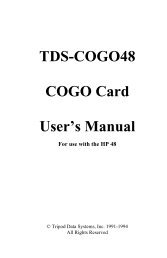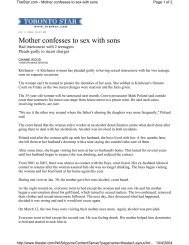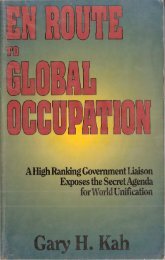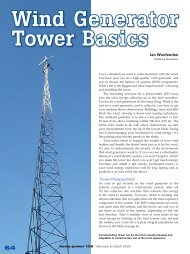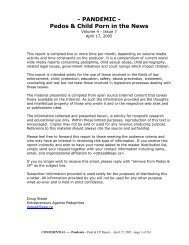G. Edward Griffin - The Fearful Master - PDF Archive
G. Edward Griffin - The Fearful Master - PDF Archive
G. Edward Griffin - The Fearful Master - PDF Archive
You also want an ePaper? Increase the reach of your titles
YUMPU automatically turns print PDFs into web optimized ePapers that Google loves.
Washington. <strong>The</strong>se bridges still stand. In his bitterness, the general exclaimed, "I realized<br />
for the first time that I had actually been denied the use of my full military power to<br />
safeguard the lives of my soldiers and the safety of my army. To me, it clearly<br />
foreshadowed a future tragic situation in Korea and left me with a sense of inexpressible<br />
shock." 13<br />
Not only did we forbid our army commanders to fight for victory in Korea, we denied them<br />
access to military assistance that was readily available. <strong>The</strong> free Nationalist Chinese on<br />
Formosa had offered to send between fifty and sixty thousand fighting men to push back<br />
the Chinese Reds. <strong>The</strong>y were confident that with very little difficulty a crushing military<br />
defeat in North Korea could set off widespread rebellion in Red China itself. <strong>The</strong><br />
Nationalist Chinese would have been a valuable help to our forces in any event, since<br />
they had a reason to fight and wanted desperately to get into it. <strong>The</strong>y offered troops, but<br />
General George Marshall turned them down because it was not felt that Chiang’s troops<br />
would be effective, and "for other reasons." On June 27, 1950, President Truman<br />
announced: ". . . I am calling upon the Chinese Government on Formosa to cease all air<br />
and sea operations against the mainland. <strong>The</strong> Seventh Fleet will see that this is done." 14<br />
We not only denied our own troops in Korea much-needed reinforcements which would<br />
have spared us thousands of casualties, but we even sent the U.S. Seventh Fleet to patrol<br />
the Formosa Straits to protect the Chinese Reds from attack!<br />
In spite of these unprecedented self-imposed handicaps, General MacArthur continued to<br />
spoil the Communist plans. At another crucial point in the fighting, the enemy once again<br />
began to fall apart. In the last half of May they had been driven back twenty miles with<br />
casualties estimated at one hundred thousand. In order to save them from complete<br />
defeat and to give them a breathing spell, UN Soviet delegate Jacob Malik proposed<br />
negotiations for a cease-fire at the 38th Parallel. And so, with our forces once again<br />
poised on the brink of victory, MacArthur was dismissed and our forward movement was<br />
halted. As negotiations began, our representatives carried a white flag into a formal<br />
assemblage of armed Communists in a spot held by the Communists. Pictures were taken<br />
and used for propaganda purposes all over Asia. <strong>The</strong> "paper tiger" was meekly suing for<br />
peace on Communist terms!<br />
And make no mistake about it, they were Communist terms. One of the key issues of the<br />
early negotiations was that of a cease-fire line. We had insisted that the cease-fire line be<br />
that point where the fighting was going on when all other major agreements had been<br />
reached. <strong>The</strong> Communists wanted us to work it the other way around. <strong>The</strong> compromise:<br />
we gave into their demands. <strong>The</strong>n there was the matter of ports of entry into North Korea.<br />
We insisted that twelve major ports of entry be patrolled by our observers to insure that<br />
the Communists were not receiving military reinforcements. <strong>The</strong> Communists said that<br />
four ports of entry would be sufficient. <strong>The</strong> compromise: four ports of entry. Another issue<br />
was whether or not Chinese Communists would be permitted to remain in North Korea.<br />
We said no; they said yes. <strong>The</strong> compromise: they stayed. Another major issue was who<br />
would supervise the truce. We said the UN; the Communists said neutral nations. <strong>The</strong><br />
compromise: neutral nations. <strong>The</strong>se "neutral" nations, incidentally, included Communist<br />
Czechoslovakia and Communist Poland. As General Parks later revealed in testimony<br />
before a Senate subcommittee, this so-called neutral nations commission vetoed<br />
inspection trips to North Korea when they could, stalled the inspections that they could not<br />
prevent, and practiced outright collusion with the Chinese and North Korean Communists<br />
to conceal evidence of treaty violations. 15


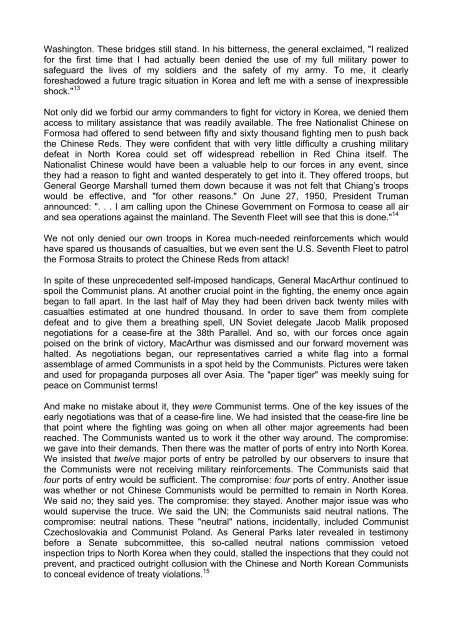
![Robert T McQuaid [rtmq@stn.net] Sent: Friday, October 29, 2004 12 ...](https://img.yumpu.com/51070071/1/190x245/robert-t-mcquaid-rtmqstnnet-sent-friday-october-29-2004-12-.jpg?quality=85)

